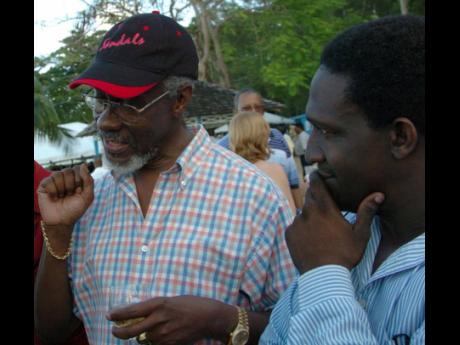Winston Witter hailed as ‘voice for poor’
The late Winston Witter, the jocular talk-show host and academic whose use of Jamaican vernacular and saucy wit wowed radio audiences and bucked mainstream trends decades ago, has been praised by friends and colleagues as “a voice for the poor”.
Witter, who was ailing from cirrhosis, died at the University Hospital of the West Indies on Wednesday. He was 64.
His meteoric rise during the 1990s started with a popular night-time radio programme at the then Jamaica Broadcasting Corporation (JBC), which made him a household name among locals from all walks of life.
He became the king of night-time radio in 1992 with 46% of nocturnal audiences, eclipsing Michael Sharpe and Leahcim Semaj.
And a 1991 survey polled Witter as the country's third most popular newspaper columnist, behind only Carl Stone and Morris Cargill but above luminaries such John Hearne, Dawn Ritch, and Ian Boyne.
But he truly came to broader prominence after assuming the moniker 'Babatunde' – the Yoruba term meaning 'the father returns' –as a host on a daytime programme on KLAS FM.
In an age in which Wilmot 'Motty' Perkins emerged as the dominant voice in talk radio, Witter became a force to be reckoned with on his call-in programme, endearing grass-roots audiences who were enraptured with his down-to-earth barroom style and irreverent humour.
That was the cult of Witter – never the icon but always the iconoclast – thumbing his nose at the airs of elitism that often attend academia.
Thriving on controversy, Witter not only discussed politics, race, colour and class, but saw himself as an entertainer – such as when he urged a fearful caller, while witnessing a trespasser on her property, to turn up the volume before he bellowed, “T'ief! T'ief!”
“He was a poor-people defender. He was their voice,” close friend and confidante, Jacqueline O'Gilvie told The Gleaner.
“Winston was a distinguished fellow when it came on to speaking the English language properly, but he spoke poor people's language and was able to speak about the issues people had, especially in the '90s, when he would challenge P. J. Patterson,” she said, referencing the prime minister of Jamaica from 1992 to 2006.
O'Gilvie said the news of his death shocked many because Witter had kept his illness from family and friends alike.
“We were all just praying that he would pull through. But Winston was a private person. And I feel it because he was at my house in December. Winston was my good friend. We are both justices of the peace, and, during my political career, he would look over my speeches for me,” said O'Gilvie.
“That was his main passion, not being a radio personality. He always said to me, 'Jackie, I never loved journalism or working on radio.' His real passion was academia. Everything he talked about was academia.”
As a young reporter, Witter honed his craft at several media houses, including The Gleaner, the Jamaica Observer, and the now-defunct Jamaica Record, Jamaica Herald, and Sunday Herald. He also worked for Hot 102.
His light dimmed on talk radio after sustaining serious injury when he was involved in a road crash in October 1998. He was a pillion rider on a motorcycle.
In the latter years of his career, Witter also worked at Bess FM.
Friend and media colleague Rohan Powell remembered Witter as a “tenacious journalist” who could smell a story from miles away.
“I had the privilege of being guided in my early career by Baba who was my news editor at the now-defunct Jamaica Record. He was about impact journalism and his guidance was par excellence,” Powell told The Gleaner Wednesday.
“One of the best of his time, Baba would be prepared to go to jail to get a story. I was so happy to have learnt at his feet, as his guidance paved the way for my success in journalism,” said Powell.

